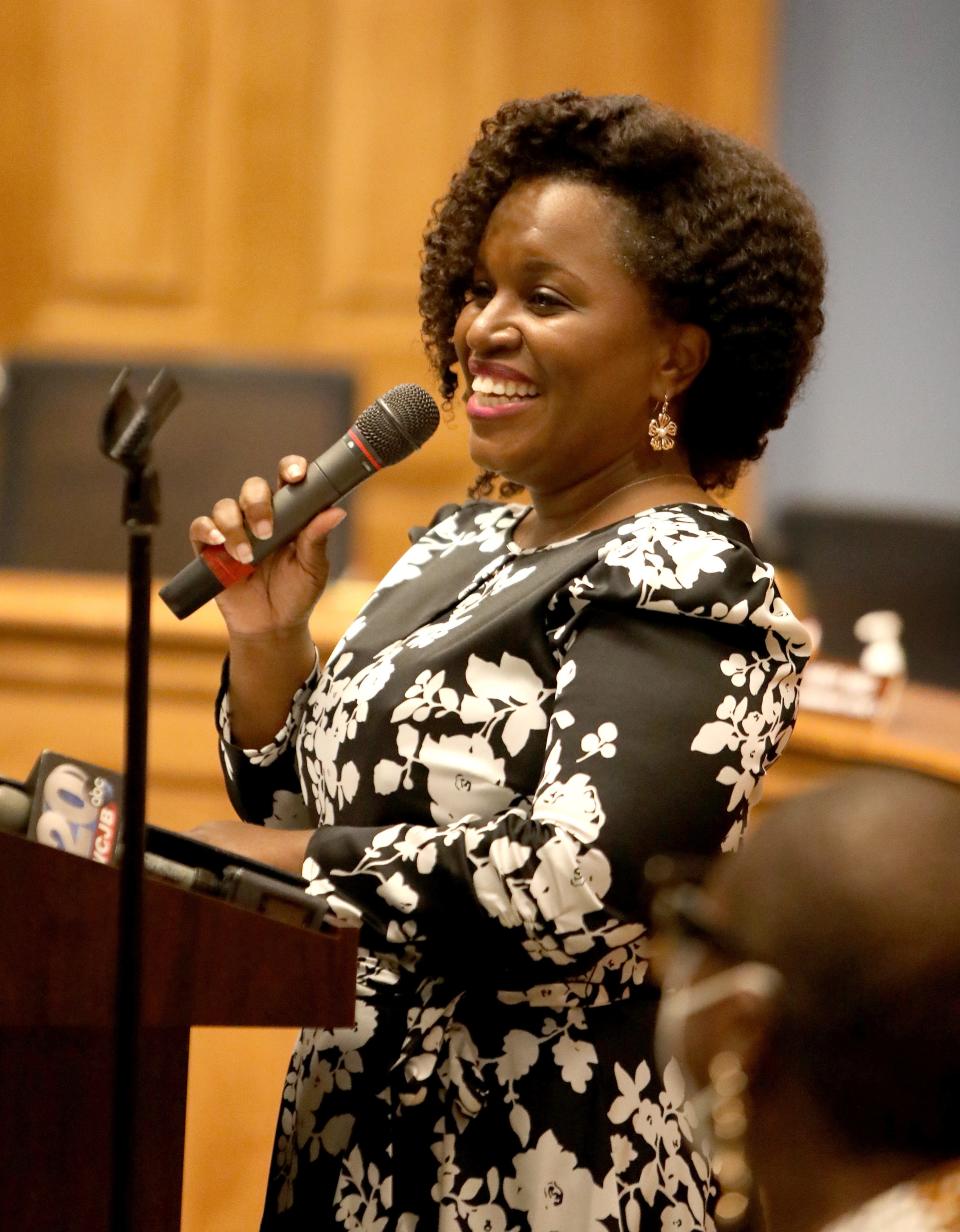Meet the Gainesville City Commission District 1 candidate: A Q&A with Desmon Duncan-Walker
Desmon Duncan-Walker is a current Gainesville city commissioner running for reelection to her District 1 seat and will face challenger Michael Perkins in the Aug. 20 election.

More: 2024 Voter Guide: Gainesville City Commission. See how the candidates stack up
Q&A
Q: What would be your approach to addressing issues with Gainesville Regional Utilities?
A: The City's relationship with GRU presents considerable opportunities for discussion and improvement. As The City and GRU Authority vie for power and control of the utility, the City's divide between "the haves" and the "have-nots" is widening and Gainesville is rapidly becoming a place that is unaffordable for many to live. While some residents take solace in the idea of a Referendum being placed on the ballot in the Fall in the interest of democracy, others' concerns boil down solely to being able to pay their utility bills, as they are struggle with day-to-day survival. In such a critical and politically uncertain moment, the issues must be met with diplomacy as, diplomacy is about finding common goals to improve quality of life for everyone and working towards those goals together.
Q: What would you say are your biggest accomplishments on the commission so far?
A: I am proud to have crafted policy in my first term that is beginning to meaningfully address critical issues that impact our quality of life such as Gun Violence and Equitable Development — a framework and plan to accompany the City’s Comprehensive Plan — (making good on my 2021 campaign promise). Also, I supported the allocation of $9 million to build affordable housing in the city. One year and a half before the US Surgeon General declared it in the country, I led the effort and made the motion (unanimously supported) that declared Gun Violence a Public Health Crisis in Gainesville, enlisted our colleagues at the County to do the same and brought in Santa Fe College to collect data and to convene a community/youth-led Task Force. (My motion and work were informed in part by the data provided by the community at my 2021 Gun Violence Town Hall that attracted 1,100 participants — something I consider to be another accomplishment.). I have also led and implemented important infrastructure improvements in District 1 such as the new light and crosswalk on East University Avenue just after NE 25th Street (where 4-year-old Dylan Roberts lost his life), bollards along NE 8th Avenue to increase pedestrian safety as well as vehicular safety and the now ADA-compliant sidewalks in East Gainesville. In addition, I always voted “no” to increasing utility rates and commission salaries.
Q: As the GRU Authority lessens its contribution to the general government, the city will be forced to reduce spending. What would you choose to cut first?
A: The work of building the City’s Budget is a function of the City Manager’s Office. Commissioners cannot involve ourselves in the day-to-day operations of the City so, it is not within the scope of our work to choose what to cut first. The Manager brings the budget before us for our approval and it is at that time that our job is to give direction as to what we would like for the Manager to change before adopting the budget.
After a line-by-line cost-benefit analysis and review of what the City Manager presents, I will not fail to make recommendations that promote the financial solvency of our organization.
Q: What is the biggest issue facing your constituents and how do you plan to address it?
A: Research has shown that Economic Development is essential in improving community health. Given the longstanding public health and economic disparities that have drastically impacted upward mobility and the quality of life of residents throughout District 1 for generations, I believe it is the biggest issue facing my constituents.
From food apartheid and the need for access to healthy foods by way of grocery stores, to health and healthcare disparities and the need for increased access to primary, mental and dental health, to the need for banking institutions, increased housing, etc., to a Downtown that is home to successful businesses yet in need of revitalization and historic neighborhoods fighting for the opportunity to benefit from development without displacement, the need for District 1’s economic development is clear.
The successful Economic Development of District 1 would stimulate and sustain job creation, industry diversification, business retention and expansion, address root causes of violence, generate much-needed increased tax revenue and improve quality of life for its residents.
Once again, the day-to-day work towards the economic development of District 1 falls to City Staff, however, I am closely monitoring the work of the City’s Eastside Health and Economic Development Initiative (EHEDI) — a critical piece in addressing the public health and economic disparities in East Gainesville as well as the Gainesville Community Reinvestment Agency (GCRA). As the new board begins its work in the upcoming weeks, I will also carefully assess the recommendations of the City’s recently seated Downtown Advisory Board, etc.
Along with careful assessment of the City’s work toward the economic development of District 1, I will work on policy to support centering neighborhood priorities and economic development strategies to include but not be limited to: small business growth and sustainability, legacy business preservation, workforce development, procurement, community ownership of real estate, public infrastructure improvement, zoning reforms, equitable real estate pipeline and resident engagement and capacity building.
This article originally appeared on The Gainesville Sun: A Q&A with Gainesville City Commission Candidate Desmon Duncan-Walker

